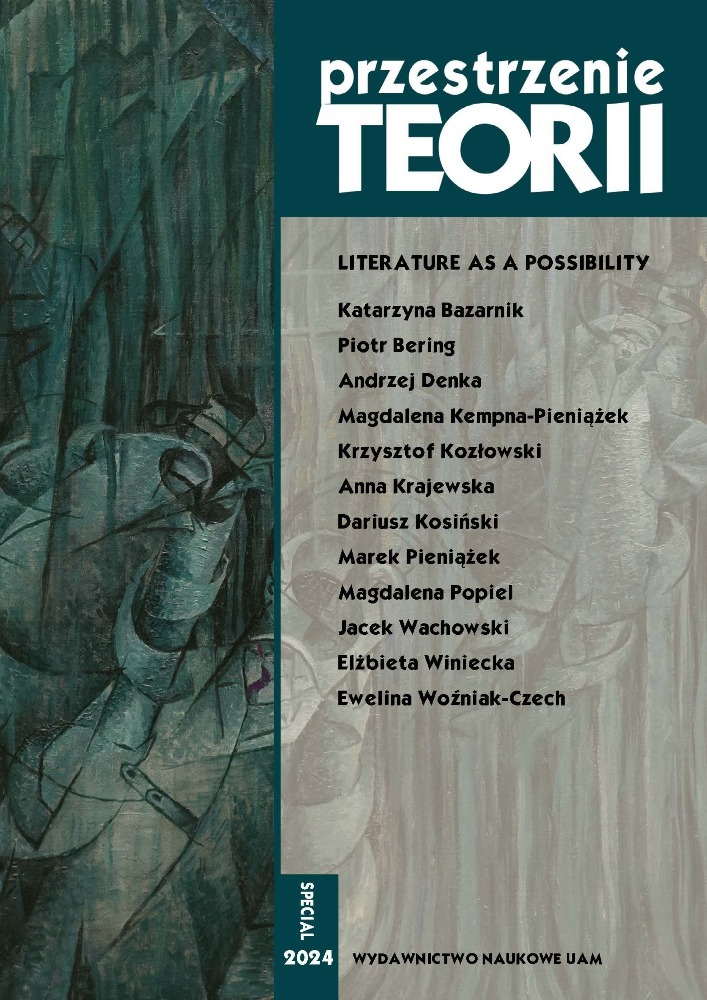Abstrakt
Zenon Fajfer’s introduced into poetry an original, interactive form called “the emanational poem,” in which the multilevel acrostic is generative of simultaneously coexisting dimensions of text. The poet has used it in several of his works to render simultaneity, visibility and invisibility, potentiality and actuality. The article discusses the emanational form in view of Aristotle’s concept of entelechy. Exploring affordances of the electronic and printed media, the author explicates how the potentiality for mobility and intertextuality can be actualised in Fajfer’s “Ars Poetica,” Spoglądając Przez Ozonową Dziurę, and Powieki, drawing attention to the role of the reader in this process. She mentions the aporetic tension between the principle of Aristotelian entelechy and postmodern concept of intertextuality, also referencing the relevance of Ned Rossiter’s network theory to the interpretation of Fajfer’s work. Focusing on Powieki, a multimodal cycle of emanational poems, published as a compound of the material book and the digital poems in the CD, the author postulates, following Pisarski (2014) and Marecki (2018), that it is an entelechy of the hypertext. Moreover, this richly hyperlinked cycle of poems can be seen as a rewriting of the Orphean katabasis. It invites contem- plation of a complex, multidimensional space that should be explored in “slow,” or close reading, which defies typical expectations of electronic literature audiences. Finally, it is argued that Fajfer’s print-born digital hypertexts activate potentialities entailed in the matter(iality) of the writing in both media, the old and the new.
Bibliografia
Aarseth E.J., Cybertext: Perspectives on Ergodic Literature, Baltimore 1997. DOI: https://doi.org/10.56021/9780801855788
Baron S., The Birth of Intertextuality: The Riddle of Creativity, New York and London 2020. DOI: https://doi.org/10.4324/9780203711057
Barthes R., Death of the Author, [in:] The Rustle of Language, trans. R. Howard, New York 1986, pp. 49–55.
Bazarnik K., Liberature: A Book-Bound Genre, Kraków 2016.
Bazarnik K., Liberature or on the Origin of (Literary) Species, [in:] Z. Fajfer, Liberature or Total Literature. Collected Essays 1999–2009, ed. and trans. K. Bazarnik, Kraków 2016, pp. 151–163.
Biela K., Encounters in Theatre and Liberature: B.S. Johnson and Zenon Fajfer. PhD dissertation, Jagiellonian University in Krakow 2022.
Fajfer Z., “Ars Poetica”, [in:] Z. Fajfer, dwadzieścia jeden liter / ten letters, ed. and trans.
K. Bazarnik, animation of the CD J. Woynarowski. Kraków 2010.
Fajfer Z. “Ars poetica”, [in:] Electronic Literature Collection 3, eds. S. Boluk, et al., Cam- bridge, Mass. 2016, https://collection.eliterature.org/3/work.html?work=ars-poetica (accessed: 4.06.2023).
Fajfer Z., dwadzieścia jeden liter / ten letters, ed. and trans. K. Bazarnik, animation of the CD J. Woynarowski, Kraków 2010.
Fajfer Z., Liberature or Total Literature (Appendix to the “Appendix to the Dictionary of Literary Terms”). Liberature or Total Literature. Collected Essays 1999–2009, ed. and trans. K. Bazarnik, Kraków 2010, pp. 29–41.
Fajfer Z., Powieki, Szczecin 2013 (Printed book and CD); the on-line part of the work available on Techsty at http://techsty.art.pl/powieki/index.html.
Fajfer Z., “Powieki (Eyelids)” [in:] Electronic Literature Collection 4, eds. K.I. Berens, et al., Electronic Literature Organization 2022,
Fajfer Z., Primum Mobile. dwadzieścia jeden liter / ten letters, ed. and trans. K. Bazar- nik, animation of the CD J. Woynarowski. Kraków 2010.
Fajfer Z., Spoglądając Przez Ozonową Dziurę, Kraków 2003 (2nd. corrected edition 2009). Fajfer Z., Bazarnik K., Oka-leczenie, Kraków (2000) 2009.
Gaver W.W., Technology Affordances, [in:] CHI’91. Proceedings of the SIGCHI Conference on Human Factors in Computing Systems. Reaching through Technology, 1991, pp. 79–84, ACM Digital Library. (accessed: 20.01.2016). DOI: https://doi.org/10.1145/108844.108856
Marecki P., Między kartką a ekranem. Cyfrowe eksperymenty z medium książki w Polsce, Kraków 2018.
mover, unmoved, Oxford Reference, https://www.oxfordreference.com/view/10.1093/oi/authority.20110803100213350 (accessed: 4.06.2023).
Nabokov V., The Vane Sisters, “Encounter” March 1959, no. 12(3), pp. 3–10. UNZ.org, http://www.unz.org/Pub/Encounter-1959mar-00003 (accessed: 17.08.2015).
Orr M., Intertextuality: Debates and Contexts, Cambridge 2003.
Pisarski M., Na kozetce (e-) liberatury. O Powiekach Zenona Fajfera [On (e-) liberatura couch. On Zenon Fajfer’s Powieki], “Techsty” 2014, no. 1(9), https://techsty.art.pl/m9/rec_m_pisarski_powieki.html (accessed: 13.12.2014). DOI: https://doi.org/10.5860/cal.12n3.13
Pressman J., Digital Modernism: Writing It New in New Media, Oxford 2014. DOI: https://doi.org/10.1093/acprof:oso/9780199937080.001.0001
Rossiter N., Processual Media Theory, [in:] Proceedings of the Fifth International Digital Arts and Culture Conference, RMIT, Melbourne, Australia, May 19–23, 2003, http:// hypertext.rmit.edu.au/dac/papers/Rossiter.pdf (accessed: 16.08.2015).
Sachs J., Aristotle’s Physics: A Guided Study, New Brunswick, NJ 1995, https://search-1ebscohost-1com-1fpm2wfls0d41.hps.bj.uj.edu.pl/login.aspx?direct=true&db=n-lebk&AN=2048&site=ehost-live (accessed: 30.05.2023).
Steinmetz S., Dictionary of Jewish Usage: A Guide to the Use of Jewish Terms, Lanham, et al. 2005.
Licencja
Prawa autorskie (c) 2024 Katarzyna Bazarnik

Utwór dostępny jest na licencji Creative Commons Uznanie autorstwa – Użycie niekomercyjne – Bez utworów zależnych 4.0 Międzynarodowe.
Autorzy
Autorzy tekstów przyjętych do publikacji w czasopiśmie „Przestrzeniach Teorii” są zobowiązani do wypełnienia, podpisania i odesłania na adres redakcji umowy o udzielenie nieodpłatnej licencji do utworów, z zobowiązaniem do udzielania sublicencji CC.
Zgodnie z umową, autorzy tekstów opublikowanych w czasopiśmie „Przestrzeniach Teorii” udzielają Uniwersytetowi im. Adama Mickiewicza w Poznaniu niewyłącznej i nieodpłatnej licencji oraz zezwalą na użycie sublicencji Creative Commons Attribution-NonCommercial-NoDerivatives 4.0 International (CC BY-NC-ND 4.0).
Autorzy zachowują prawa do dalszego, swobodnego rozporządzania utworem.
Autorzy, którzy wykorzystują w swoim tekście cudze utwory (np. ilustracje, fotografie) proszeni są o dostarczenie do redakcji czasopisma zgodę na publikację od uprawnionych podmiotów.
Użytkownicy
Zainteresowani użytkownicy internetu uprawnieni są do korzystania z utworów opublikowanych po 2015 roku „Przestrzeniach Teorii” tylko w calach niekomercyjnych, pod następującymi warunkami:
- uznanie autorstwa - obowiązek podania wraz z rozpowszechnionym utworem, informacji, o autorstwie, tytule, źródle (odnośniki do oryginalnego utworu, DOI) oraz samej licencji;
- bez tworzenia utworów zależnych - utwór musi być zachowany w oryginalnej postaci, nie można bez zgody twórcy rozpowszechniać np. tłumaczeń, opracowań.
Do wszystkich tekstów opublikowanych przed 2015 r. prawa autorskie są zastrzeżone.
Inne
Uniwersytet im. Adama Mickiewicza w Poznaniu zachowuje prawo do czasopisma jako całości (układ, forma graficzna, tytuł, projekt okładki, logo itp.).

